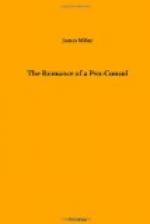How winsomely Sir George made the Queen a living personality as well as a mighty name to the native races! ‘Ha-ha!’ cried Maori; African, Australian, ’the Queen is indeed our mother, for Governor Grey shows it by his acts. But the eloquent word on that, came from an old Kaffir woman, whom nobody owned, Lot Hrayi. This was her epistle, through the Governor to the Queen:
’I am very thankful to you, dearest Queen Victoria, that you have sent, for me, a good doctor, a clever man. I was sixteen years blind, Mother and Queen, but now I see perfectly. I see everything. I can see the stars, and the moon and the sun. I used to be led before; but now, Mother, O Queen, I am able to walk myself. Let God bless you as long as you live on earth; let God bless Mother! Thou must not be tired to bear our infirmities, O Queen Victoria.’
To Sir George, Lot Hrayi’s despatch was a State paper. ‘Native races,’ he laid down, ’understood personal rule, and the great thing was to make the Queen vivid, a reality, to them. England? Yes, it was a place far distant, where there were no dark-skinned peoples. The Queen of England? Ah, yes, they could comprehend her! She sat on a throne, so beautiful that its place must be where all was beautiful and good. Her heart beat for her folk, irrespective of their colour; she would minister to their happiness. Nothing could more delight her, than to secure the well-being of those who claimed her powerful protection. That was intelligible!
’Thus, when I had a measure of mercy, of justice, or of guidance to announce, I did it directly, in the Queen’s name, and in the native languages. It was the Queen’s utterance, though spoken by me, and it would be difficult to indicate how well the charm worked. Go into a cottage, in almost any part of England, and you will, I judge, find a portrait of the Queen hanging on the whitewashed walls. There were no portraits in the Kaffir kraals, yet the Queen entered them, a beneficent influence in many a crisis.’
Striving to attach the Kaffirs, Sir George granted them written titles to their lands. They could not at first perceive the object of the parchment, and he would express it thus: ’If you have any trouble with your lands, it is only necessary for you to go to a judge with this document. He will read it, and if there is a real grievance, he will have it put right. Even the Queen’s army might be ordered away from a place, by a few policemen, if a judge so directed.’
The chiefs would often say afterwards: ’Oh, Sir George Grey explained to us, all about the advantages under which we held the land. He told us that the Queen, herself, could not turn us off the ground, without going to the supreme courts which dispensed justice in her name. If a claimant were found not entitled to a piece of land, he would be removed by the Queen’s officers. But if he had right behind his claim, why, he would be maintained in it by those officers.’




